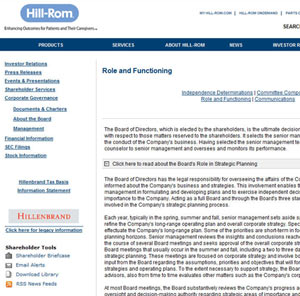


On Sept. 23, 2010 the NYSE Euronext (NYX) released the final report (PDF) of the NYSE–sponsored Commission on Corporate Governance.
One of the ten key items is —
Good corporate governance should be integrated with the company’s business strategy and not viewed as simply a compliance obligation. [Almost a year earlier our post The Board’s Role In Corporate Strategy suggested a more active Board role in Business Strategy.]
The Commission believes that sound corporate governance should be a core element of a company’s business strategy, as it includes independent and objective oversight of strategy and management by boards; alignment of interests among shareholders, management and the board; accountability of the board to shareholders and accountability of management to the board; compensation programs that incentivize long-term growth; establishment of criteria that are aligned with the company’s business goals; prudent risk management; a culture of integrity; and consideration of the impact of the corporation’s activities on society overall.
This makes a strong case for the Board’s active involvement in the development and continuing review of the company’s business strategy. Too many companies delegate the formation and execution of the business strategy to management. Further, many Boards review the business strategy once a year.
However there are some companies that are already practicing the NYSE’s recommendations.
One such company is TD Bank Financial Group. In their online Corporate Governance practices they state–
Strategic Planning Process
The board is responsible for overseeing the execution and fulfillment of our strategy and fundamental goals. This responsibility includes adopting a strategic planning process; and continuously considering and approving strategic alternatives and plans that management presents. The board assesses the bank’s major opportunities and risk impact of any strategic decision being contemplated, including considering whether any strategic decision is within the bank’s approved risk appetite established for the bank and its individual business units; oversees the implementation of strategic plans; and monitors performance against such plans.
Continuing Education
…In the past year, the board participated in in-depth sessions (“deep dives”) on particular aspects of our businesses and overall strategy. Each deep dive includes an element of general education as context for the discussions (e.g., the industry; competitors; trends; and risks/opportunities). Directors also have complete access to management to understand and keep up to date with our businesses and for any other purposes that may help them fulfill their responsibilities.
This discussion seems to be very much in line withe the NYSE recommendation. The problem is these items are somewhat buried within a lengthy document. TD would do well to highlight their Board actions regarding business strategy, perhaps discussing this in their Leadership Views in the Media Room.
Another example comes from Hill-Rom a medical products company.
The Board’s role in Business Strategy is described in a concise discussion on the (Board) Role and Functioning section within Corporate Governance
In summary:
The Board’s Role In Strategic Planning
The Board of Directors has the legal responsibility for overseeing the affairs of the Company and, thus, an obligation to keep informed about the Company’s business and strategies. This involvement enables the Board to provide guidance to management in formulating and developing plans […] Acting as a full Board and through the Board’s three standing committees, the Board is actively involved in the Company’s strategic planning process.
Each year, typically in the spring, summer and fall, senior management sets aside specific periods to develop, discuss and refine the Company’s long-range operating plan and overall corporate strategy. Specific operating priorities are developed to effectuate the Company’s long-range plan. […] These meetings are focused on corporate strategy and involve both management presentations and input from the Board regarding the assumptions, priorities and objectives that will form the basis for management’s strategies and operating plans […]
At most Board meetings, the Board substantively reviews the Company’s progress against its strategic plans and exercises oversight and decision-making authority regarding strategic areas of importance and associated funding authorizations.
In addition, Board meetings held throughout the year target specific strategies and critical areas for extended, focused Board input and discussion.
The Board’s role is inextricably linked to the development and review of the Company’s strategic plan.
From this one can see that the Board is actively involved. The Board does not simply delegate the plan to management. Nor do they let a year elapse before they receive well orchestrated presentations for management. They appear to be following a process suggested by John Rehfeld in his article The Company Director’s Role In Company Growth —
| Goals | Develop | Approve | Execute | Review/Changes | |
| Board | Primary | Actively Participate | Primary | Stay informed | Primary |
| Management | Provide input | Primary | Primary | Provide input |
Adapted from The Director’s Role In Company Growth
While the NYSE’s recommendations are relatively new, these companies provide examples for other companies to follow.
Lucy is Editor at Corporate Eye



